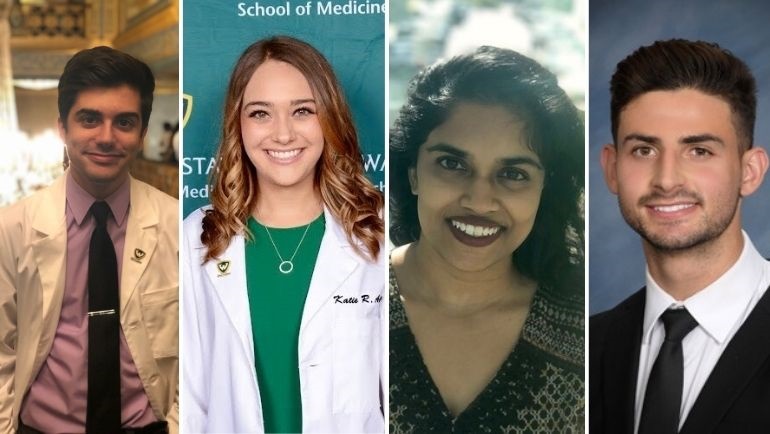
Upperclassmen in years three and four of their medical training at the Wayne State University School of Medicine will co-facilitate the Problem-Based Learning curriculum that freshmen and sophomore medical students attend.
The addition comes after a pilot program incorporating the advanced students met with resoundingly positive feedback.
Students like the Class of 2023’s Trishya Srinivasan volunteered as a co-facilitator because of a love for encouraging others and sharing her knowledge, experiences and even mistakes, she said.
“I loved every bit of getting to co-facilitate PBLs. It’s inspiring to see how the team interacts and solves the clinical vignette together,” she said. “As medical education moves toward embracing team-based learning, there will be more opportunities to continue enhancing new content-delivery methods, such as PBLs and collaborative peer-to-peer education, while contextualizing material within clinical examples. I hope that PBLs continue to incorporate peer-to-peer education and involve student input in developing future PBLs and its potential offshoots.”
Her classmates, Kenan Alhayek and Katie Adlaka, brought up the idea to incorporate students as co-facilitators after moving through the curriculum as first-year students.
“We knew that curriculum changes would not impact our own education. However, we were motivated to potentially have an impact on the education of our younger peers who will become our future colleagues,” Adlaka said.
A group of faculty, staff and medical students met virtually last summer to design a program that rolled out in October 2020. The collaboration offered a peer-level perspective while working through case studies with first-year students. It was designed in response to student data collected by the Case Studies student organization as well as PBL facilitator feedback.
“We are incredibly grateful to attend a medical school that empowers students to bring about change. There is tremendous opportunity for growth and development at Wayne State as the administration listens to students and always searches for ways to enhance the learning experience,” Adlaka said.
Alhayek is president of the Case Studies Organization, and Adlaka is vice president.
They surveyed the Class of 2023 to gauge thoughts on the idea of student- and faculty-led PBL sessions.
“After receiving positive feedback, we decided to approach the administration to present our thoughts. It was exciting for us to be invited to present the survey results before the PBL Subcommittee and pitch our idea. The committee was overwhelmingly receptive to the concept and enjoyed hearing constructive feedback from students. Following many pre-clerkship curriculum subcommittee meetings, we got the idea off the floor and into motion,” Adlaka said.
“Opportunities to provide near-peer learning not only benefit the learners, but allow the facilitating students to develop their communication skills and teaching abilities. We are both humbled and fortunate having seen the vision we spearheaded come to life in a positive way. We can’t wait to see how future PBL sessions continue to evolve with the new student co-facilitator model,” Alhayek added.
The goal of the pilot was to see if first-year students benefitted from having a senior student co-facilitator in their PBLs offer clinical insight, a breath of familiarity and a near-peer perspective.
“Thanks to Katie and Kenan, we have been able to improve the learning experience for students participating in Problem-Based Learning,” said Erika Roberts, manager of Academic and Student Programs in the School of Medicine’s Medical Education Support Team.
“The feedback from the Class of 2024 has been extremely positive so far,” Alhayek said. “This pilot would not have been possible without the above and beyond work by Ms. Roberts, who was instrumental in making the PBL pilot come to fruition.”
In the revised program, a student facilitator is paired with a faculty/staff facilitator and a group of seven to nine first-year students. Student facilitators ask probing provided questions to redirect students when necessary and facilitate proper research practices. The faculty/staff facilitator plays an evaluator role, observing the freshmen student engagement in the session and formally evaluating them following the session. Training and preparation support is provided to all student facilitators.
Professor of Internal Medicine Noreen Rossi, M.D., participated in the pilot program as a faculty facilitator. She was matched with Alhayek on sessions related to gastroenterology and renal physiology.
“I can attest that his input made the session proceed on time and without a glitch in the technology,” Dr. Rossi said. “More than that, his substantive input in fleshing out the probing questions so that the questions related in a better way to year-one students from their mindset was invaluable. He did not provide answers, but truly probed their knowledge, and was a perfect complement to my facilitation. His facilitation showed that he has a firm grasp of the material, far beyond that of many M2s, and is able to elicit a productive and effective educational response from his colleagues.”
For fourth-year medical student James Stathakios, volunteering as a student co-facilitator provided the opportunity to work with first-year students in a year when interaction has been severely limited by the pandemic, he said.
“The experience as a co-facilitator was both engaging and rewarding. It encouraged me to refresh my knowledge of basic science and its application to clinical scenarios. I was also able to reflect on the progress that I have made throughout medical school. I appreciate the respect that I received from our first-year students and feel honored to be viewed as someone who can contribute to their medical knowledge,” Stathakios added. “I believe that allowing senior students to participate as co-facilitators will ease the pressure of the PBL experience and encourage first-year students to participate freely without fear of being wrong. Participation is an obstacle in general, especially over Zoom, but I feel optimistic that student co-facilitation will lead to more open and candid discussions of the case.”